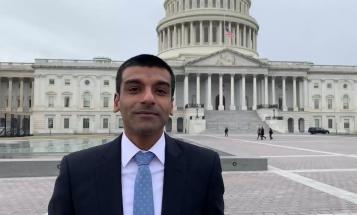
Defending Seattle’s Democracy Voucher Program
Update: Demos is pleased to report that on Friday, November 3, Washington Superior Court Judge Beth Andrus dismissed this misguided challenge to Seattle's Democracy Voucher program. The court reasoned that the program will help increase participation in the electoral process. It also rejected the challengers' argument that the program is unconstitutional simply because a candidate that a taxpayer supports might not receive as much public funding as a candidate with more popular support. Demos will continue to follow the case in anticipation of an appeal, which would be filed to the Washington Supreme Court within 30 days of the decision.
In 2015, by a 26-point margin, Seattle voters passed an initiative that has the potential to transform Seattle elections. The initiative established a first-in-the-nation program that affords Seattle residents with $100 in “democracy vouchers,” which they can distribute to candidates who pledge to receive more of their funding from small-dollar sources and less from big money.
This is the first year of elections under the program, and it has already expanded political opportunity in Seattle. Over 11,000 Seattleites have already made voucher contributions to Seattle City Council candidates—compared to just 6,900 private donors who contributed to the mayoral election (which is not yet covered by the program) in the same period. For some Seattle residents, the democracy vouchers are game-changing: the difference between participating as a donor and not. As low-income Seattle resident Gina Owens has explained, “I realize that I can participate in a way I’ve never done before because of Seattle’s new Democracy Voucher program.” And as the Guardian reported, in this first election under the program, homeless individuals—many of whom lack the money needed for basic survival, let alone for making political contributions—amplified their collective political voice by aggregating their democracy vouchers.
By empowering people who would not otherwise be among an elite Seattle donor class, the Democracy Voucher program fosters the political agency of the people of Seattle. As Roi-Martin Brown, a long-time civil rights activist and a member of Washington CAN!—a community-based organization that helped to pass the Democracy Vouchers program— explains:
The [vouchers’] monetary amount may be small by today’s political standards, but I believe the vouchers allow more voters to participate and counter other professional lobbying efforts to some degree . . . the vouchers give voters like me, who don’t have a PAC or support from an organization back[ed] by corporate money, an opportunity to support candidates whom I trust.
Despite the program’s apparent popularity, it now faces a misguided legal challenge by 2 property taxpayers represented by the conservative Pacific Legal Foundation, who claim the program violates their First Amendment rights. They argue the program discriminates against taxpayers on the basis of their viewpoints because under the program, the candidate or candidates that a property taxpayer supports might not receive as much public funding as candidates with more popular support.
This understanding of the First Amendment could not be more wrong. Demos recently filed an amicus brief defending the Democracy Voucher program against this meritless attack on behalf of numerous community-based groups and national organizations who helped to develop and pass the initiative, including Washington CAN!, APACEvotes, Every Voice, Fix Democracy First, Fuse, LGBTQ Allyship, OneAmerica, Represent.Us, the Washington Democracy Hub, the Washington Public Interest Research Group (“WashPIRG”) and Win Win Network.
As the brief explains, the purpose of the First Amendment is to protect free speech in order for us to be free to govern ourselves in our democracy. Democracy demands that a person’s ideas are no more or less important simply because she is rich or poor. The Democracy Voucher program strengthens democracy in Seattle by decreasing wealth-based barriers to participating in local elections as a donor and as a candidate, and by decreasing a valid and corrosive perception of corruption in Seattle. In strengthening democracy in these ways, the program actually advances—and certainly does not violate—the First Amendment.
Programs like Seattle’s that allow those with less money to make campaign contributions or run for office can also advance racial equity. Elections dominated by big money keep many qualified community leaders who don’t have access to wealthy personal networks from running for office. Because of our country’s long history of oppressing people of color, which persists in large racial wealth gaps today, these wealth-based barriers are more likely to hurt candidates of color and the communities who support them. Candidates of color are less likely to run for office in the first place, and raise less money when they do. In contrast, programs like Seattle’s that are designed to empower small donors and the candidates they support lead to more diverse candidates from historically marginalized communities running for office.
Demos is proud to stand with the communities and groups that helped pass this ground-breaking and democracy-strengthening initiative.



